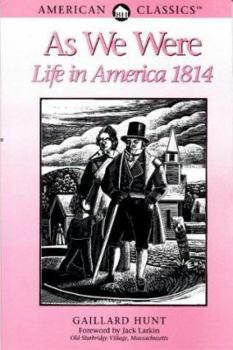As We Were--Life in America 1814
Select Format
Select Condition 
Book Overview
No Synopsis Available.
Format:Paperback
Language:English
ISBN:0936399546
ISBN13:9780936399546
Release Date:January 1993
Publisher:Berkshire House Publishers
Length:318 Pages
Weight:0.90 lbs.
Dimensions:0.9" x 5.4" x 8.3"
Related Subjects
HistoryCustomer Reviews
2 ratings
Life in the Democratic Republic
Published by Thriftbooks.com User , 18 years ago
Gaillard Hunt served in the Department of State and the Library of Congress. He edited James Madison's papers, wrote a life of Madison, a biography of John C. Calhoun, and other volumes on political and social history. This book was originally sponsored to advocate an Anglo-American alliance in 1914 by creating a pleasant view of history (p.xiii). It offers informative accounts of everyday American life and popular culture lacking in conventional histories. America was a collection of rural places where farming and small-scale commerce were the economy. Hunt's outlook was that of a "social Darwinist", and Larkin does not say why such a book could be written today. [Perhaps J. Anthony Lukas' "Big Trouble" can provide a look a life a century ago?] The 'Preface' tells the purpose of Hunt's book (p.xix). Chapter III reminds us of the political geography of that era. Chapter IV describes the composition of the population. The North and the West were growing. New York alone had tenant farmers. Early Americans were reputed to have a love of money (Chapter V). The egalitarianism and frugality of Northerners is contrasted to the aristocratic planters of the South (Chapter VI). Chapter VIII tells of travel by coach and sloop; no canals or railroads. Chapter X explains why women were not prominent in early American political life. Since there was no permanent governing class, women could not ascend to power! Divorce was almost unknown. Most people feared the theater as a dangerous excitement to the imagination that produced immoral conduct; prostitutes attended to attract attention. Actors often had a bad reputation. Fiddle playing was popular, frontiersmen believed it frightened off wolves (Chapter XI). Chapter XII tells about life for the "Common People". Men worked 12 to 15 hours a day, six days a week, for 70 cents. Women and children could be whipped at work. Strikers were beaten down, and the leaders jailed. Some cities regulated work and pay. The apprentice system prevailed in the trades. Chapter XIV describes religion in those times; morality came from religion. The churches declined after the Revolution, but "The Great Revival" changed that. Colleges were created to train the ministry. Medical schools were started (most students apprenticed to a physician). Chapter XV describes the early schools. Education was regarded as a luxury for the rich! Children were taught manners as well as reading, writing, and arithmetic. Noah Webster's Speller sought to create a national language. Chapter XVIII tells of the campaigns against drinking and gambling. Observance of the Sabbath was strict: no labor, shopping, entertainment, travel, or lounging. Pennsylvania innovated with confining prisoners alone in 1790. When New York followed this example they found prisoners went mad when kept in isolation (Chapter XIX). Chapter XX tells how "the poor and sick" were treated. Poverty resulted from being a wage-earner. Asylums for orphans and the elderly were started.
A clear window into the past.
Published by Thriftbooks.com User , 26 years ago
Written at the beginning of the Great War at the behest of certain influential Anglophiles, Hunt's work was intended to celebrate one hundred years of peace between America and Britain, and, perhaps, to dispose Americans to the British side of the developing cataclysm. Whatever the intent, the result is a valuable window into life in the new Republic, discussing matters of State and politics, but focusing on social conditions and the matters of everyday life among the ordinary (and, of course, largely rural) people. Travel, education, food, medicine, and amusements are just some of the subjects touched upon in this very useful and readable work, and the author has the happy gift of incorporating necessary numerical information in a most painless way. Hunt's clear-eyed evaluations of the social institutions of the day, particularly slavery, may grate on modern sensibilities, but the work is valuable overall in its view of life in an era little known to most Americans. (The "score" rating is an ineradicable feature of the page. This reviewer does not "score" books.)





